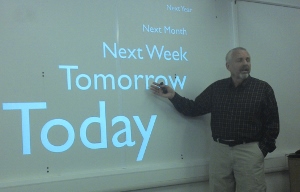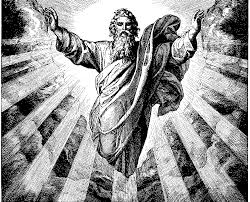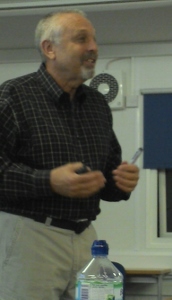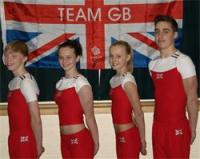Main Menu
Latest Blog Entry
User login
DARE to be different: Vern Gambetta lecture
“Dissect, Appraise, Reflect, Examine: Evaluate yourself constantly”
Vern Gambetta giving sound advice to the MSc Strength and Conditioning students at the University of East London last night.
Vern gave two lectures, the first on planning training and the second on coaching. It was a small group of students, plus myself, course leader Nick Bourne, and some football coaches.
“Periodisation is a concept not a model”
 “The interaction and interdependence of the training components” is what planning training is about.
“The interaction and interdependence of the training components” is what planning training is about.
Unfortunately periodisation research over the last 20 years has been mainly strength based.
Strength is easy to develop and it is easy to measure. But, how does it interact with skill, speed or flexibility? These were the questions that Vern was asking.
He started off with an historical background; looking at the devastation of the second world war and the impact it had on manpower in the USSR and East Germany (n.b. to our U.S. friends: it started in 1939, not 1941!). The sheer amount of casualties meant that training had to be a lot smarter.
This, coupled with the Stalinistic cultural approach of 5 year plans, led to periodisation being developed to the degree it was.
But, when faced with an athlete who wants to win a medal in 2 years time, abstract concepts have little impact. Instead, Vern emphasised the need for developing themes, but “winning the workout” today is what is important.
Planning concepts
 “Every time you train you put money in the bank, every time you compete you take money out“.
“Every time you train you put money in the bank, every time you compete you take money out“.
The accumulation of work done day to day, week to week and month to month adds up,
Whilst we are led by the competition schedules, it is important to put the money into the bank when you can. This can be done at in small parts, or bigger parts, but it has to be done.
Adapatation times are different depending on the biomotor quality (strength, speed, stamina, skill, suppleness) you are training, the combination of qualities and also the individual athlete.
- Tasks that require complete recovery are NEURAL: max speed,lifts and highly techncial sessions.
- Tasks that can be trained with incomplete recovery are METABOLIC: aerobic work, low level skills, some strength work.
This is important to understand when you set up the training week. Vern uses a 14 day or 21 day cycle to prevent the congestion which happens in the normal 7 day microcycle.
Each cycle has 3 distinct phases:
- Preparation
- Adaptation
- Application
(I use similar but add regeneration as our 4 cornerstones of training).
“Coach is God syndrome”
 After all the planning takes place, it is easy to think that the athlete’s day revolves around the 2 hours that we spend with them.
After all the planning takes place, it is easy to think that the athlete’s day revolves around the 2 hours that we spend with them.
Vern emphasised the need to understand the athlete first: it is the other 22 hours that dictate what we do in our 2 hours!
This includes understanding lifestyle, academic stress, the current state of physical education as well as:
- Biological/ Chronological/ Training ages of the athlete
- Adaptability/ Recoverability of each athlete
- Cognitive ability: how smart are they at picking things up in training?
“Tapering with a team is a nightmare” said Vern and “peaking is a bit of a crap shoot rather than a darts match“. It is difficult to pinpoint the exact moment of peak performance, instead you can plan to peak in a window.
The rest may be down to mental preparation and rehearsing those tough competition decisions in practice. Structuring the sports practice is an essential part of planning.
If the practice is planned and executed correctly, then it will have an impact in your game. “Rather than train like you play, adapt an attitude of play like you train” Dean Benton.
(I see this a lot with a strength coach living in isolation in the weights room being told to make the team faster, whilst the practice on the field is making players slower through poor design).
However, “Peaking starts with the first training session of the year” according to Gary Winckler so what you do in June will impact how well you peak in the following April.
Summary
 Vern took some questions and then presented on his coaching journey and some lessons he has learnt. To me this is the crucial part that is missing in education in this country.
Vern took some questions and then presented on his coaching journey and some lessons he has learnt. To me this is the crucial part that is missing in education in this country.
“We’re athletes. We’re not integers in a formula” said Chris McCormak, Ironman champion.
Vern gave some great examples of what has worked, what has gone less well and how he has developed in his 44 years of coaching including:
- “Make connections among seemingly unrelated information”
- “Specialise in being a generalist”
- “Know it’s not the links,but the linkages that make the system”
This requires effort, dedication and a desire to improve. It also requires looking outside of our own narrow field for ideas, practices and inspiration.
I have seen Vern talk on planning a few times now, but it is usually at the end of GAIN when my brain is like a bowl of mushy peas. It was good to see him when I was fresh!
As usual, I came back with a reading list, some areas for me to look at my own practice and a renewed sense of enthusisam for trying to coach my athletes better.
Further reading:
Client Testimonials
 Weston AGC
Weston AGC
I first met James at a South West Gymnastic conference and thought he was superb then, and still do! James' ability to adapt to different sports and levels is excellent, and he is superb at getting his message across to different ages of gymnasts. He did a workshop at our club for our competitive gymnasts and it was superb, His work was of great value to a wide range of ages and levels, with a tremendous emphasis on posture and injury prevention. We have been able to put his training methods into practice and are seeing an improvement in the all round strength and fitness of our gymnasts.
More

